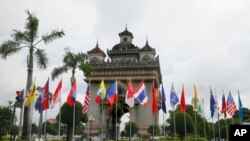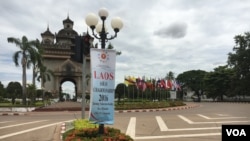President Barack Obama is seeking to reassure nations in Southeast Asia that the U.S. is firmly committed to its rebalance to the region during his historic trip to Vientiane, Laos this week.
Obama's arrival Monday will mark the first time a sitting U.S. president has visited the country.
He will be attending the Association of Southeast Asian Nations (ASEAN) summit and the East Asia summit, where he will seek to further deepen ties and increase America's influence in the region.
White House officials said Obama will seek to advance U.S.-Laos relations given the increased focus on the Asia Pacific, and America's goal to serve as a counterweight to China's growing role and power in the region.
The U.S. leader will meet with Laos President Bounnhang Vorachit at the presidential palace on Tuesday. The Lao Communist Party elected the new leader earlier this year.
Laos, which has been criticized for its human rights record, is currently ASEAN chair.
White House officials said the bilateral meeting continues the administration's policy of reaching out to country's with which the U.S. has had troubled relations.
Later, Obama will deliver a speech on his Asia policy and its impact during his presidency.
"He'll talk about how far we've come in shaping an architecture in the Asia Pacific for the United States to lead and to be at the table in forums like ASEAN and the East Asia Summit," said Ben Rhodes, deputy national security advisor.
Obama will credit his policy with increased commercial, economic and security ties and for more partnerships in the region to deal with sensitive issues like maritime security.
During the speech, the U.S. leader will also make his case for ratification of the Trans-Pacific Partnership (TPP), a massive trade deal facing intense criticism in the United States. Critics argue the deal will eliminate jobs in the U.S.
The agreement, which includes 12 Pacific rim countries, is a critical economic component of Obama's Asia policy. He has expressed confidence he can persuade the U.S. Congress to ratify the pact during a post-election session in the final months of his presidency.
Without TPP, Obama's strategy is significantly weakened, experts said.
"We have a robust security arrangement, formally with allies and informally with other partners in the region, but that can't stand by itself. It doesn't have the economic underpinnings," said Douglas Paal, vice president for studies at the Carnegie Endowment for International Peace
Opposition to the trade deal is fueling skepticism in Asia about America's commitment to the rebalance, according to experts.
On the streets of Vientiane, residents expressed tempered hope about the future, well after President Obama departs and the summits come to a close.
"About Obama coming, a lot of people are happy. This is interesting for a lot of people," said Sompaseuth Kounnavong, who runs a small grocery store near the site of the summits.
"For the short term, it is good for business," she said. But the shop owner declined to predict beyond that, adding simply "We want to see everything change."
Mek Boubong, who works in the tourism industry, was more optimistic.
"I hope his coming here will help the country develop," he beamed. "Everything is changing."
During his visit, Obama will hold a town hall with young people, make cultural stops and focus on U.S. efforts to help clear unexploded ordnance in Laos. About a third of the 2.2 million tons of bombs dropped on Laos by U.S. forces during a 9 year secret operation during the Vietnam war remain undetonated. The problem has slowed development in the country.
Besides attending the summits, Obama will also meet with other regional leaders before departing on Thursday, marking the end of his eleventh and final trip to Asia as U.S. president.






